This day in history 30 October
Images
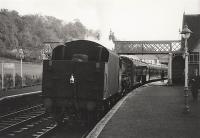
Callander (Dreadnought): Black 5 45214 after arrival at Callander on 30th October 1965 with the Saturdays only 12.10pm from Stirling. This was the last day of passenger services before closure of the line.
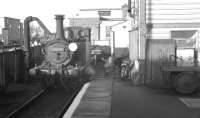
Havant: LBSCR Terrier 0-6-0T no 32650 takes on water at the end of the bay platform at Havant in October 1962. This platform was used by trains serving the Hayling Island branch.
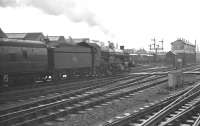
Swindon: Castle class 4-6-0 no 7035 Ogmore Castle at Swindon station on 30 October 1962 with the 11.45 London Paddington - Cheltenham St James.
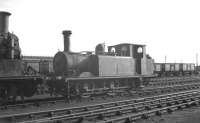
Eastleigh Shed: SR 'Terrier' 0-6-0T no 32678 photographed in the shed yard at Eastleigh in October 1962.
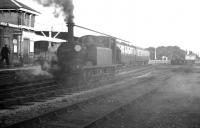
Hayling Island: A smokescreen descends over Hayling Island station on 30 October 1962 as LBSCR Terrier 0-6-0T no 32650 runs round the branch train from Havant. The 1876 veteran (which hauled the last scheduled BR service over the branch on 3 November 1963) survives in preservation.

Eastleigh Shed: Terrier 0-6-0T no 32678 standing alongside Lord Nelson 4-6-0 no 30857 Lord Howe in the shed yard at 70D Eastleigh in October 1962.
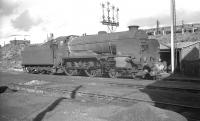
Reading South: SR Schools class 4-4-0 no 30915 'Brighton' in the shed yard at Reading South (70E) in October 1962.
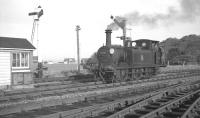
Hayling Island: LBSCR Terrier 0-6-0T no 32650 photographed at Hayling Island on 30 October 1962.

Eastleigh Shed: Locomotive lineup at Eastleigh shed in 1962 featuring Drummond T9 'Greyhound' 4-4-0 no 120 (30120), outshopped from Eastleigh Works 6 months earlier in LSWR green livery. It was officially withdrawn by BR at the end of July 1963 and is now preserved as part of the national collection. The locomotive is currently on loan to the Bodmin and Wenford Railway see image [[21111]].

Eastleigh Shed: Locomotives on shed at Eastleigh in October 1962, featuring 2-4-0WT no 30587, one of the famous Southern Railway well tanks designed by Joseph Beattie. Built in 1874 by Beyer Peacock, at their Gorton Works in Manchester (at a cost of £2,570) no 30587 was withdrawn by BR in December 1962. The locomotive now forms part of the national collection see image [[22748]] and can be seen operating on the Bodmin and Wenford Railway wher e it is on extended loan from the NRM.

Eastleigh Shed: Maunsell Class W 2-6-4Ts 31922 and 31912 stand outside Eastleigh shed in October 1962.
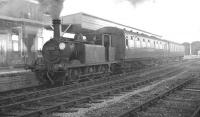
Hayling Island: LBSCR Terrier 0-6-0T no 32650 stands at Hayling Island with the branch train from Havant in October 1962. This particular locomotive, built in 1876 (and which survives in preservation) hauled the last scheduled BR service over the Hayling Island branch on Saturday 3 November 1963.
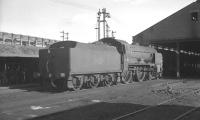
Reading South: The SR shed at Reading South (70E) in October 1962. Schools class 4-4-0 no 30915 'Brighton' stands in the yard.

Thornton Shed [2nd]: J36 0-6-0 65345 stands in the shed yard at 62A Thornton Junction in October 1964 alongside B1 4-6-0 61350.
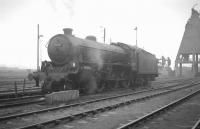
Thornton Shed [2nd]: B1 4-6-0 no 61147 in the shed yard at Thornton in October 1964.

Thornton Shed [2nd]: WD Austerity 2-8-0 no 90350 in the shed yard at Thornton Junction in October 1964.
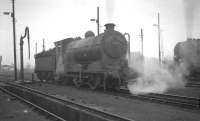
Thornton Shed [2nd]: J37 0-6-0 no 64632 stands in the shed yard at Thornton Junction in October 1964.
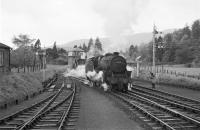
Callander (Dreadnought): Black 5 45214 runs round at Callander, on 30th October 1965, the last day of passenger service before closure of the line. The locomotive was working the Saturdays only 12.10pm Stirling – Callander and 1.18pm Callander - Glasgow Buchanan St.
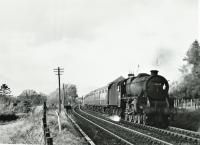
Drumvaich Crossing: On what I believe was the final day of operation before closure of the Callander – Dunblane section of the Callander and Oban line, Black 5 45214 comes through the passing loop at Drumvaich. The train was the 1.18pm Saturdays only Callander – Glasgow service. 30th October 1965.
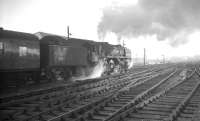
Carlisle: Kingmoor's Britannia Pacific no 70039 Sir Christopher Wren heads south out of Carlisle in January 1965, shortly after taking over the 9am Perth - Euston.
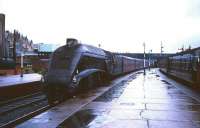
Stirling: Gresley A4 Pacific no 60019 Bittern coasts into a rainsoaked platform at Stirling station in 1965 with the 7.10am Aberdeen - Buchanan Street train.
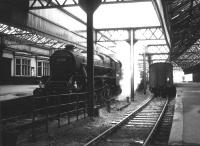
Greenock Princes Pier [2nd]: Black 5 no 44903 with a boat train at Greenock Princes Pier in October 1965. The station had closed to scheduled passenger services in February 1959 but boat train traffic continued until November 1965. Freight services ended in September of 1966 and the station was demolished the following year.

Greenock Princes Pier [2nd]: The last passengers alight from a boat train on a rainy day at Princes Pier, Greenock, in the mid sixties. Standard class 4 no 76114 stands ready to couple up at the rear and take out the empty stock. Scheduled passenger services had ceased to run to Princes Pier in February 1959 but the station continued to handle boat trains and specials until November 1965.

Lesmahagow Junction: A Clayton takes a freight north through Motherwell on the WCML in October 1970. The train has just passed through the station and is about to pass the Motherwell Bridge works.
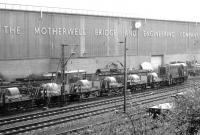
Lesmahagow Junction: Shunting sidings alongside Motherwell Bridge and the WCML in October 1970. The Motherwell Bridge sidings were beyond the fence. See image [[56105]]
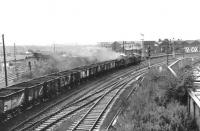
Lesmahagow Junction: One of a pair of Claytons leaves a smokescreen over Motherwell shed as it passes by on a northbound freight in 1970. The train is passing the remains of the old coaling stage with the turntable visible on the extreme left of the picture.
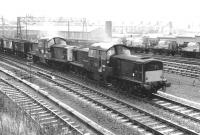
Lesmahagow Junction: A dull and overcast Autumn day in Motherwell in 1970, contributed to in no small way by a pair of Claytons struggling past with a freight. Lead locomotive is Polmadie's D8558, finally withdrawn at the end of the following year.
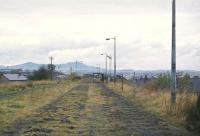
Lingerwood Weighbridge: The double track trackbed of the Easthouses Tramway looking west from near [[Lingerwood Mine]] in October 1971. The [[Lady Victoria Pit]] is in the background beyond the bridge over the A7. The parallel trackbed to the left carried the standard gauge mineral line . A photograph showing a loaded coal train using the tramway near this point is shown at [[72286]]. Prior to the end of cable haulage the standard gauge line was on the right and tramway to the left.
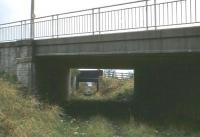
Easthouses Extension Pit: Looking south from Easthouses along the route of the tramway on 30 October 1971. The pit had closed in 1969 and lifting of the tramway was completed during 1970. The bridge nearest the camera carries the B6482, with Mayfield Road crossing the earlier road bridge beyond. In the distance, the old footbridge that linked Broadhurst Road with the public park on the west side of the line is just visible. (See [[71401]]).
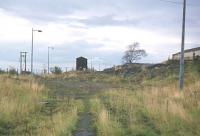
Easthouses Extension Pit: Looking north from just beyond Easthouses Road towards the remains of Easthouses drift mine in October 1971, just over two years after closure. View is along the route of the lifted Easthouses Tramway.
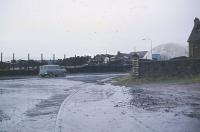
Arniston Colliery Engine Pit: Looking north on the trackbed of the line which linked the Gore and Lady Emily pits and extended across Engine Road, Newtongrange into Arniston Engine. As can be seen, at this time the rails were still visible in front of the two houses called Emily Bank and across Engine Road. Emily Bank was a pair of overseers' houses when Emily and Gore Pits at Arniston Engine were operational and is a category C listed building (see [[61737]]).
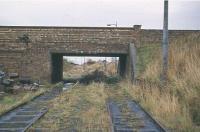
Lingerwood Junction [2nd]: Looking north along the Easthouses Tramway in October 1971 as it passed below Lingerwood Road in the direction of Easthouses. The junction of the lines serving Lingerwood and Lady Victoria pits is behind the camera.
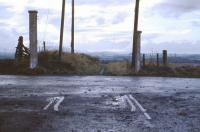
Carberry Colliery Pits Nos 2 and 3: Recent photographs of the line from from Smeaton to Carberry Colliery where it crossed the A6124 prompted the addition of this photograph. I took this on 30th October 1971Â (alas I seem to take photographs on dull damp days in October!). Looking towards Smeaton it shows track at the A6124 level crossing still in situ but tarred over see image [[68142]].

Yarmouth Beach: The Eastern & Midland Railway logo cast into the canopy spandrels is the giveaway to this location being the former Midland & Great Northern terminus at Yarmouth. The station did not really close to passengers in 1959 - it merely swapped trains for buses and carried on as a coach station until final demolition in 1986. This photo shows the deserted coach station in October 1977 and illustrates perfectly the reason for the railway's closure. Whereas the station was a hive of activity on summer Saturdays as holiday makers came and went, out of season there was very little passenger traffic.

Yarmouth Beach: A panorama of Yarmouth Beach station as it stood on 30th October 1977. The station was unusual in having undergone a direct rail to road traffic conversion after the last trains ran in 1959. As shown in the photo, bus and coach stances were installed at track level along the length of the platforms with platform access steps so waiting passengers could be sheltered and use the retained station offices and facilities. By modern standards, the unprotected platform edge would be unacceptable in a non-railway context. Demolition of the station took place in the mid 1980s.
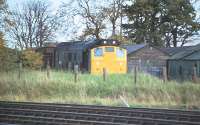
Elgin East: 25227 shunting the GNSR yard at Elgin on 30 October 1978. What lay behind the bushes, I never found out!

Elgin Centre Signal Box: 25227 shunting the GNSR yard at Elgin on 30 October 1978.
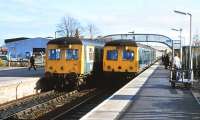
Elgin: A pair of DMU's passing in Elgin Station on 30 October 1978.
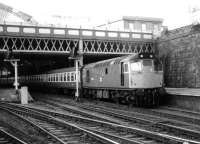
Glasgow Queen Street High Level: BRCW 27033 awaiting departure time at Glasgow Queen Street in October 1980.
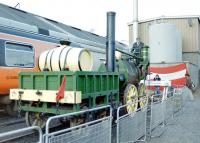
Ayr MPD: Ayr MPD Open Day on 30 October 1983 with a replica of 'Sans Pareil' on display.
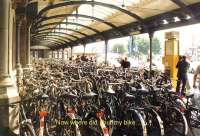
Amsterdam Central: Now where did I put my bike? Amsterdam Central 1985.

Wensley: A westbound train on the Wensleydale Railway about to pass over Wensley station level crossing on its way to Redmire in October 2004.

Redmire: The road approach to Redmire in October 2004. The station had been closed to scheduled passenger traffic by BR in April 1954, although by this time it had become the western terminus of the Wensleydale Railway.
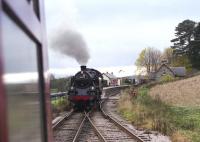
Broomhill: Standard 4 tank no 80105 having run round it's train now approaches the stock before bringing it back into Broomhill station on 30 October 2004.

Broomhill: 80105 stands at Broomhill with a train for Aviemore on 30 October 2004.
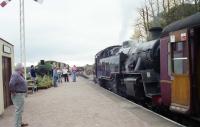
Broomhill: BR Standard 4MT 2-6-4T 80105 waits at Broomhill in October 2004 with a train to Aviemore.
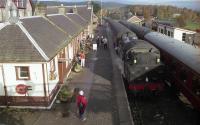
Boat of Garten: 80105 arrives at Boat of Garten with a Broomhill to Aviemore service on 30 October 2004.
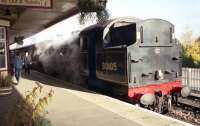
Aviemore: BR Standard Class 4 2-6-4T no 80105 has just arrived at Aviemore station with a train from Broomhill on the Strathspey Railway on 30 October 2004.
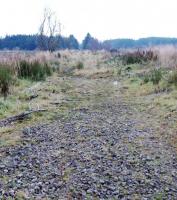
Leadburn Summit Siding: View south from Leadburn Summit in 2004. On the right was a siding used in the early days when steam engines were less powerful. A loaded train could be placed here and taken forward with a second train on the downhill to Peebles.
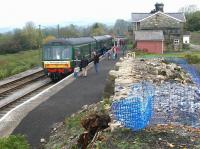
Redmire: A Wensleydale Railway DMU for Leeming awaits its departure time at Redmire on 30 October 2004. View is west towards Hawes, looking over the partially demolished coal drops.
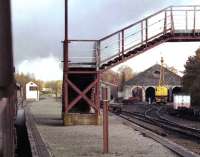
Aviemore Speyside: Passing the closed station of Aviemore Speyside on 30 October 2004, with Aviemore shed below the ex GNSR footbridge. The photograph was taken from the window of a train on the Strathspey Railway heading for Boat of Garten and Broomhill.
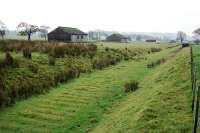
RNAD Leadburn: Remains of RNAD Leadburn looking towards Lamancha in October 2004. Sleeper indentations remain prominent along the length of the trackbed.
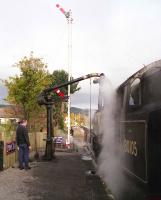
Boat of Garten: Standard class 4 2-6-4T no 80105 takes water at Boat of Garten on 30 October 2004 at the head of an Aviemore to Broomhill service.
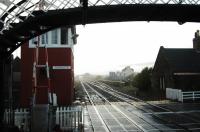
Carnoustie: The view west at Carnoustie in 2005 showing the box, footbridge and former station building from the original Carnoustie station. This building, probably dating from 1838, was demolished in 2018.
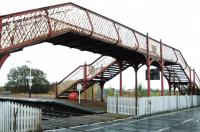
Barry Links: Barry Links station has quite a footbridge, as seen in 2005.
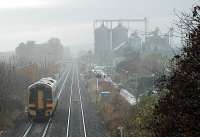
Carnoustie [1st]: 158.734 heads south at Carnoustie in 2005. Golf Street station can be seen in the distance.
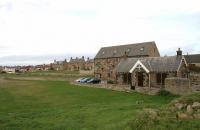
Burghead [1st]: Site of the old goods yard at Burghead in 2005 looking towards the harbour. The original line curved around to the left here towards the site of the original 1862 terminus. This closed in 1892 to be replaced by a new through station located off to the right when the line was extended to Hopeman.
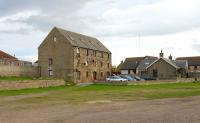
Burghead [1st]: Site of the goods yard at Burghead in October 2005. The original line passed along the bottom of the picture on its way to the passenger terminus.
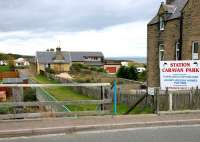
Hopeman: The former Hopeman station, looking west along the platform in October 2005. As can be seen from the sign the location is now part of a caravan/holiday park.
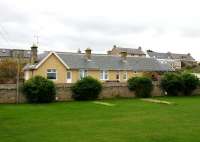
Hopeman: The refurbished Hopeman station building from the north in October 2005.

Speymouth Viaduct: The Spey Viaduct in the autumn of 2005, looking west towards Garmouth. The angle shows the three eastern approach spans and the central Bowstring structure.

Speymouth Viaduct: Approaching the Spey Viaduct from the west in October 2005. Located just east of Garmouth on the GNSR Moray Coast line, the viaduct spanned a wide section of the River Spey close to its mouth. The large structure consists of a central bowstring span of 386 ft, with three 107 ft lattice girder spans on either side forming the approaches see image [[5789]]. Opened in 1884, the railway route across the viaduct finally closed in 1968 and now forms part of the Speyside Way.
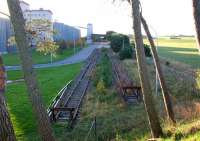
Roseisle Maltings: View south at Roseisle Maltings near Coltfield on the former Hopeman branch in October 2005. The disused branch line from Alves Junction can be seen on the right.

Speymouth Viaduct: View east over the Spey Viaduct, near Garmouth, on 30 October 2005.

Greenloaning: Looking across the running lines and loops to Greenloaning signal box in October 2005, viewed from the northwest.
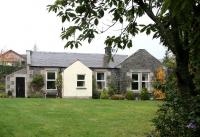
Clovenfords: The former station at Clovenfords on the Peebles - Galashiels line on a wet 30 October 2006. Closed in February 1962 the building is now a private residence standing in the midst of a modern housing development. See image [[34315]]
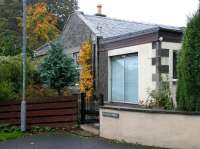
Clovenfords: Part of the modified 1866 station at Clovenfords on the Peebles loop. Closed with the line in 1962 the building is now an attractive private residence. Photographed on a rainy afternoon in October 2006. See image [[5658]]

Yorkhill Quay: Following a fire at Yorkhill Quay in the fine old dockside warehouses the site is now available for redevelopment. To the right is the route of the dockside lines, now the Clydeside Expressway, and the approach to Kelvinhaugh and Stobcross, now an essential part of the electrified north bank lines.
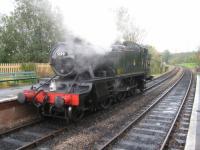
Kingscote: A visitor to the Bluebell Railway in 2008 - 'Large Prairie' 2-6-2T No.5199.
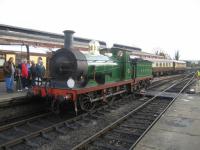
Horsted Keynes: South Eastern & Chatham Railway 'C' Class 0-6-0 No. 592, which dates from 1902, is seen at Horsted Keynes on 30th October 2008, prior to working a train to Sheffield Park.

Caledonian Road and Barnsbury: An RHTT (or loco-hauled 'leaf train' if you prefer) passes Caledonian Road & Barnsbury station en-route from Liverpool Street to Richmond on 30 October.

Niddrie North Junction [Lothian Lines]: You really need a map to make sense of the confusion of lines which filled the eastern wedge of Edinburgh see image [[31418]]. This is the point wher e goods-only Lothian Lines 'main' line was crossed by the A1, seen here on 30 October 2010. It split into 3 behind me at Niddrie North. In 1972, with the line gone, the area was taken over by an early out-of-town hypermarket (what a wonder, but by today's standards quite modest) and this was the route between the store and the petrol station. Asda was resited in the 1980s to make way for a dual carriageway and a new link to Portobello called after Sir Harry Lauder (a local man) which follows the route of the Lothian Lines over the ECML. Keeping coal traffic bound for Leith Docks clear of the ECML was the line's raison d'etre.
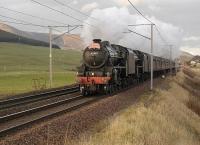
Wandel Mill Signal Box: 45407 and 44871 pass Wandel Mill, just north of Abington, with an empty stock movement from Fort William to Carnforth on 30 October.
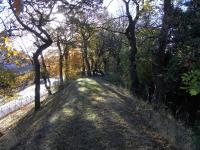
Portobello [1st]: A look along the embankment of a railway which closed over 150 years ago. This was part of the Leith arm of the Edinburgh & Dalkeith Railway, photographed in October 2010. The line here ran parallel with Baileyfield Road which is to the left. Somewhere around here was the first Portobello Station. Because of the period and the nature of the line I don't imagine it was very substantial and there's certainly nothing to see today. It appears to be autumn on the left of the picture and spring on the right. I don't remember noticing this at the time; I think my camera is possessed.

St Leonards: Site of the short-lived early passenger terminus - and much longer lived goods station - of St Leonards, south-east of Edinburgh City Centre. The site fanned out from a tunnel which ran (and still runs) through the foothills of Arthur's Seat to a point between Samson's Ribs on one side and the Bonnie Wells o' Wearie (R Burns) on the other. If this sounds rural then it certainly looks it, and well within the City boundary.

Gomshall: First Great Western DMU 165105 arrives at the staggered - platform Gomshall station on a Redhill to Reading service on 30 October 2010.
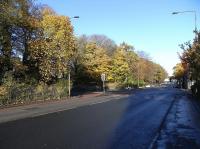
Portobello [1st]: The Leith arm of the cross-shaped Edinburgh and Dalkeith Railway of 1831 left the hub at Niddrie and crossed what was then open country. It never came of age (in the terms of the time) as it closed in 1849 when it was superseded by a branch from the North British Railway, now the ECML. On this stretch it ran parallel with Duddingston Park (a road) and Baileyfield Road after bridging Duddingston Road, in the centre of this view of 30 October. Behind the trees the embankment is remarkably intact, having survived the attentions of developers for over 150 years, and provides shelter and a view for the houses behind. The ECML can be seen crossing Baileyfield Road in the distance.
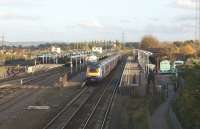
Didcot Parkway: A scene of considerable activity at Didcot station on Saturday 30 October 2010. From left to right there are FGW Turbostars at platforms 5 and 4; a Cross Country service has just departed east from platform 3 towards Reading with a service to Bournemouth, while a FGW HST is arriving from the west at platform 2. The increased activity is due to closure of the line towards Oxford for engineering work and the need for rail replacement buses, two of which can be seen in the car park on the right.
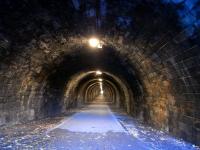
St Leonards Tunnel: A look southeast into the tunnel at St Leonards. Originally horses were used for haulage and would have clopped along here even when steam was becoming commonplace. This supposedly led to the nickname 'The Innocent Railway' but, like all such names, you have to wonder just who, if anybody, called it that.
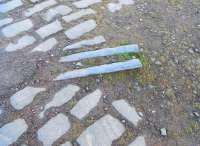
St Leonards: This fragment of the former goods station at St Leonards in Edinburgh reminds me of a fossil dinosaur bone exposed by tectonic shifts. Photographed 30 October 2010. See image [[21311]]
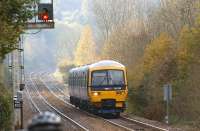
Gomshall: FGW DMU 165109 arrives at Gomshall station on the North Downs in a sylvan setting on 30 October 2010. The service is heading to Redhill from Reading and is on the boundary between Guildford and Reigate Signalling Centres.
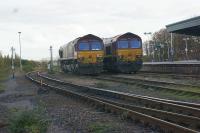
Didcot Parkway: A pair of EWS Class 66s sit in the sidings next to Didcot station on 30 October 2010 waiting for their next working. [Ref query 21 October 2017]

St Margarets Shed: The top part of Restalrig Road South ran immediately east of St Margarets shed. It is always known locally as Smokey Brae, said to be because of the reek (in Edinburgh terms) from the North British shed. There's no reason to doubt this, though in a famously reekie city things must have been especially bad here for the name to have come about. Although Smokey Brae is not its official name the council recognises through this sign that it is the de facto one. Incidentally the usual spelling is smoky, and my dictionaries don't recognise smokey even as a variant spelling, but I see from the web that it is used in other proper names. See image [[26920]]

Edinburgh Waverley: Haymarket North tunnel is closed at weekends until Christmas to allow for electrification work. The consequent short workings are making for significantly quieter west end of Waverley station. There's not a single train in any of the 6 platforms visible here on Saturday 30 October.
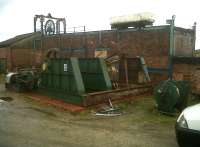
Apedale Valley: I asked my hosts how the wagon got up there - they said it saw a mouse. A varied display of mining equipment at the Apedale Heritage Centre in Staffordshire. see image [[36329]]
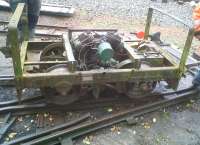
Apedale Valley: It's not every day that you see a rail vehicle powered by an engine designed for motorcycle use, and even less often that said engine powered a car on the way - especially a three-wheeler. This maintenance cart, however, seems to be designed around its JAP vee-twin, which previously powered a Morgan car. One of around 200 exhibits at this fine museum.

Wolverhampton: Victorian integrated transport. This inclined passageway, lit by the setting sun in October 2011, connected Wolverhampton High Level station (left at the far end) with Low Level (to the right), so long as you weren't distracted by the Great Western pub (over left shoulder). Notice the virtual piano on the right.
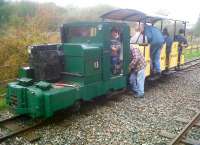
Apedale Valley: Is there room for a little one? The BLS all line tour of the Apedale Valley Light Railway only had room for 17 passengers and a brakeman. The engine is a 4-wheeled Simplex diesel with transverse radiator. The AVLR is located in the 454 acre Apedale Country Park near Newcastle-under-Lyme, once an opencast mining area.
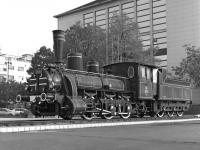
Zagreb Glavni kolodvor: This ungainly (to British eyes) 0-6-0, No. 125 052, is seen here plinthed at Zagreb Glavni kolodvor, Croatia, in October 2011. The type was built in large numbers for the Hungarian State Railways (MAV) between 1882 and 1897 as class 326 and shows clear Austrian influence in its design. On the formation of the state of Jugoslavia after WW1, the new railway administration there inherited a number of these locos and gave them class number 125.

Zagreb: A close up of the front end of ancient 0-6-0 No. 125.052 standing on a short length of track outside the main station at Zagreb, Croatia, in November 2011. Such plinthed locos are a common feature at stations in the former Jugoslavia and this one, at least, seems to be a favourite perch for the local pigeons.
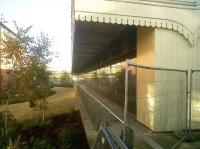
Wolverhampton Low Level: This station was derelict for too long, but is now entering a new life, as a pub (over left shoulder), hotel (off picture to right), flats (left, where the Up platform stood) and entertainments complex (right, on the down platform). It could be better, but it could be a lot worse. View towards Birmingham in October 2011.
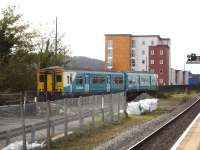
Cardiff Central: Arriva Trains Wales 150283 stabled at Cardiff Central Station in October 2012. The unit is in the down side siding alongside Cardiff Panel Box that is normally used by freight locos between duties.
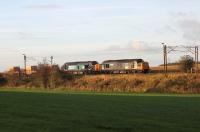
Oubeck Loops: Two different DRS liveries (both now being replaced as locos are overhauled), lit by an early morning autumn sun at Oubeck Loops on 30 October as the Crewe to Sellafield flasks head north behind 37038 and 37602.
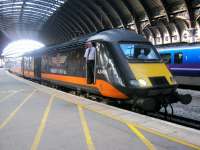
York: Power car 43465 of Grand Central Railways awaits its departure time from York on 30 October at the head of a Kings Cross-Sunderland train.
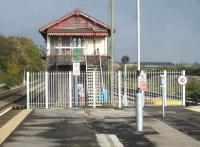
Barry: The now redundant mechanical signal box at the east end of Barry station island platform on 30 October 2014, following completion of re-signalling and transfer of control to Cardiff. The palisade fence running across the full platform in front of the box is repeated at the west end of the platform.
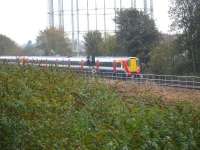
Reading Southern: South West Trains 458508 approaching Reading Station on the ex Southern line, near the site of the former Reading South shed, on a service from London Waterloo via Staines. Photographed on 30 October 2014 from a passing train on the GW main line.
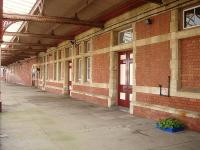
Barry Island: A view behind fencing along most of the platform side wall and full length canopy at the former Barry Island station building in October 2014. The building is now mostly occupied by Cambrian Transport, who operate the Barry Tourist Railway. There is also a café and military museum located just off picture to the right.
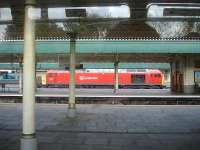
Cardiff Central: Grab shot from a Barry Island service departing from Cardiff Central on 30 October, showing refurbished DB Schenker 60024 heading slowly east through the station with a heavy consist of steel slab.
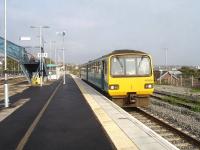
Barry: Now withdrawn Andrew Barclay built, with Walter Alexander body, pacer 143606 stands at the restored island platform 3 at Barry station on 30 October 2014, with the 10.51 ex Aberdare to Barry Island service. The platform is bi-directionally signalled. The pacer is now preserved at the Llanelli & Mynydd Mawr Railway. At extreme right centre of the view can be seen the tracks in the lower level eastern end yard for the former 88B Barry shed, now operated by Cambrian Transport.
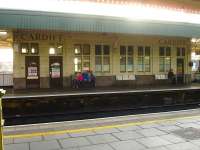
Cardiff Central: The platform buildings at Cardiff Central remain virtually as built, as seen in this view of the west end waiting room and toilet block on Valley Line island platforms 6/7 on 30 October 2014.
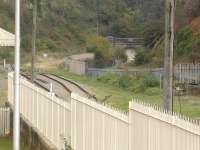
Barry Island: A long lens view from the footbridge at the east end of Barry Island station in October 2014. In the right background is the closed off north portal of the railway tunnel that gave access to Barry Pier station, from where ferries once operated to Weston-super-Mare. See image [[31352]]
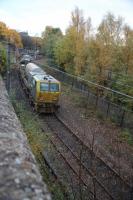
Sunnyside Junction: The railhead treatment unit returning to Mossend shortly afte rSunnyside Junction on the Whifflet Loop on the 30th of October. Barely visable through the trees is the 311 unit (311 103) stored at Summerlee Heritage Park.
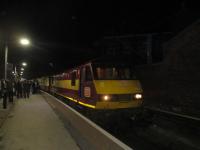
Doncaster: Doncaster station after dark on 3rd October 2015 with 90037 now at the head of return UK Railtours excursion from Carlisle to London Kings Cross, having taken over from D9009.
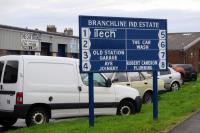
Templehill Junction: Troon's Branchline Industrial Estate is at the harbour end of the former south to west chord which opened with the 'New' Troon station and loop in 1892.

Ayr Station Hotel: The Eighth Wonder of the World - The Hanging Gardens of Ayr Station. This view shows the rail side of this badly-neglected building. At last the local press and politicians are taking notice of this.<br> <a target=external href=https://www.dailyrecord.co.uk/news/local-news/safety-fears-ayrs-iconic-station-6669192>Link to Daily Record article</a>.
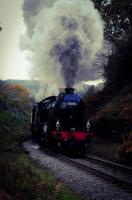
Beckhole: K1 2-6-0, 62005 darkens the sky at Beckhole, heading a Whitby to Pickering 7 coach set up the 1 in 49 on the NELPG 50th Anniversary weekend. It was loud, very loud.
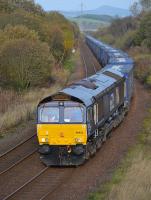
Lumphinnans Central Junction: The Inverness - Mossend intermodal, diverted through Fife because of engineering work in the Stirling area, passes the former Lumphinnans Central Junction behind DRS 66423, on 30 October.
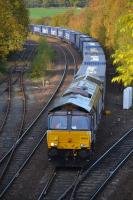
Inverkeithing Central Junction: The Inverness - Mossend intermodal, diverted through Fife because of engineering work in the Stirling area, passes Inverkeithing Central Junction, behind DRS 66423, on 30 October.
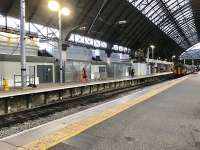
Glasgow Queen Street High Level: The temporary staff facilities, housed in cabins at the east side of the station alongside platform 7, are now being brought in to use.
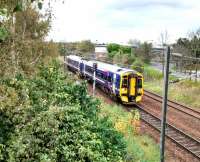
Niddrie North Junction: A morning service from Tweedbank approaches its penultimate stop, Brunstane, on 30th October 2017. The 158 is still in First Scotrail livery, nine years after the saltire one was introduced. Meanwhile signal EP (Edinburgh Portobello) 604 says No, which is immensely reassuring.
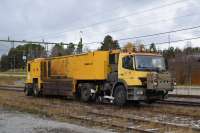
Järpen: L&S (Luddenheit und Scherf GmbH) Rail grinder RRGM 1-20 waits in one of the sidings at Järpen Station. This machine has been undertaking overnight maintenance on the line west of this town. These sidings originally for freight now see some use by engineering trains including ballast loading operations. Postboat Lisa was probably unloaded here nearly 100 years ago see image [[61247]]
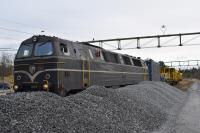
Järpen: General Motors TMZ loco built by NOHAB for DSB. Now owned by Railcare it was idling in the engineering sidings while track ballast was being loaded onto the trucks behind the 'bothy' wagon see image [[61670]].
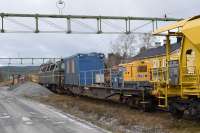
Järpen: A late autumn scene with traces of early snow where two engineering trains are in the station sidings at Järpen in western Jämtland. Closer to the camera is a ballast train; this is loaded from the ballast heaps using the mechanical loader. Loco is Railcare TMZ 1418. Note the onboard generator and crew 'bothy' on an adapted flat wagon. The yellow building behind is Järpen Station. In the background is a rail grinder see image [[61633]].
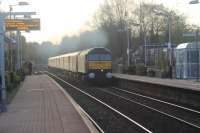
Maryhill: 47804 leading an empty coaching movement from Fort William to Carnforth through Maryhill on 30th October 2017.
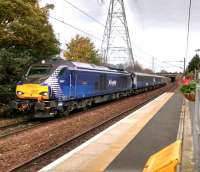
Brunstane: 68 007 Valiant on the 'Sub' opposite Brunstane station on 30th October 2017. This is the first of two ECS workings to Motherwell, returning the stock from morning Fife locals. They will return in the afternoon to take the commuters back. This does seem an excessive distance for 8 daily workings, Monday to Friday. I am assuming the reason is economic; it certainly can't be environmental.
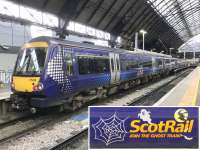
Glasgow Queen Street High Level: 170430 dressed for Halloween at Glasgow Queen Street on 30th October 2017.
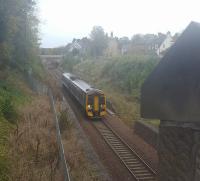
Eskbank and Dalkeith: 1354 ex-Waverley rushing past Eskbank & Dalkeith.
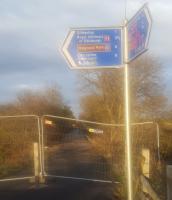
Gilmerton: The Glencorse branch is undergoing conversion by Sustrans to a cycleway near the Lasswade road.
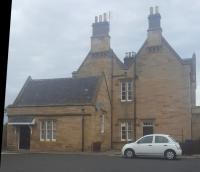
Eskbank and Dalkeith: The old station house at Eskbank and Dalkeith.
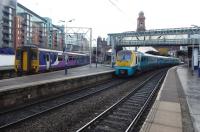
Manchester Oxford Road: A Transport for Wales service from Chester to Piccadilly calls at Manchester Oxford Rd on 30th October 2018. I admit to a slight disappointment that this wasn't the expected Class 67 powered train. On the left, in Bay Platform 5, Northern 156460 waits to form a service to Liverpool via the Cheshire Lines route through Warrington Central.
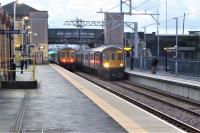
Kirkham and Wesham: Dusk at Kirkham and Wesham on 30th October 2018. Two Northern Class 319 EMUs, both working between Manchester Airport and Blackpool North, pass beneath the new footbridge.
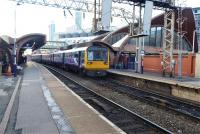
Manchester Oxford Road: A Pacer/Sprinter combination, working from Blackpool North to Manchester Piccadilly on 30th October 2018, slows alongside the distinctive canopies and concourse of Manchester Oxford Road station. These Bolton line services should go over to EMU operation in December and that will be the beginning of the end for the Northern Pacers.
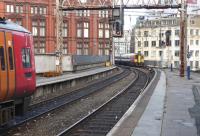
Manchester Oxford Road: EMT 158846, on the 1057hrs Norwich to Lime St, rolls into Manchester Oxford Road on time at 1543hrs with just 31 miles of a 250 mile journey to go. On the left sister unit 158774 is waiting to travel the same route in the opposite direction. 30th October 2018.
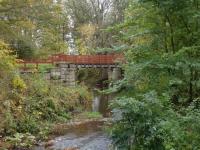
Ponteland: The remains of the bridge which carried the Ponteland Railway, and the Darras Hall Tramway, over the river Pont just to the south of Ponteland Station. This is now a footbridge. 30th October 2018
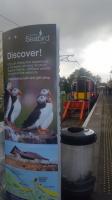
North Berwick: Puffin with pride at North Berwick on 30th October 2018.
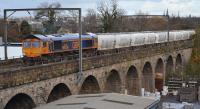
Slateford Viaduct: GBRf 66736 Wolverhampton Wanderers crosses Slateford Viaduct on 30th October 2018 hauling the North Blyth - Fort William alumina train.
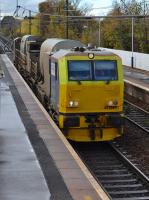
Slateford: DR 98911 passes Slateford on 30th October 2018. The MPV was making its way to the nearby Civil Engineers yard having spent many hours travelling around Central Scotland on RHTT duties.
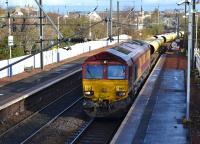
Slateford: 66093 comes off the 'Sub' at Slateford with the Hartlepool South Works to Mossend pipes. 30th October 2018.
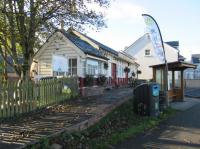
Cardrona: Once-derelict Cardrona station used to stand in isolation when seen from the A72 but is increasingly being crowded out by housing. There is now a proper village which didn't exist when the station closed in 1962. The trackbed immediately to the west of the station is being built over and the old platelayers' hut (qv) has gone. I am sure Nashy's Coffee House is fine, but it is not a name I would have chosen - even if I were called Nashy.
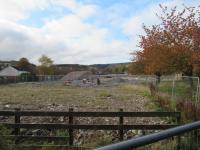
Peebles [CR]: Whatever forgettable buildings stood on the site of Peebles Caledonian station are themselves now history, or rather rubble. View looks west; the platform edge would have been in front of the camera. Photographed 30 October 2019.
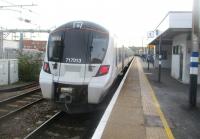
Hornsey: 717013 from Watton-at-Stone in Hertfordshire to Moorgate heading away from the camera as it departs from Hornsey station in north London, on 30th October 2019. This was one of the original GNR stations of 1850, irreparably damaged when rebuilt by BR in 1976 for the electrification of the London suburban services. This saw the platforms on the main line ECML tracks abolished, leaving only one side of both island platforms for local trains. The shoddy buildings date from the same time while the replacement ticket office, inconveniently sited on a bridge linking both sides of the line and which involves lots of steps (and badly lit at night too), resembles more a public convenience than a railway station.
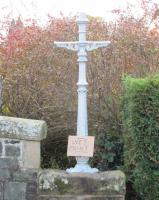
Peebles [CR]: Old gaslamp column at the top of the carriageway to the Peebles West (or Caledonian) station. In answer to your questions of course I did and no it wasn't, but it smelled like it was - Hammerite, if I am not mistaken.
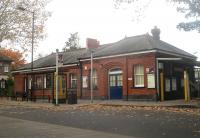
Grange Park: Grange Park station on the GNR Hertford North Loop, now in commercial use, on 30th October 2019. The station is still open and passengers enter and exit through the gate on the right. Although situated on the original 1871 section of the GNR's Enfield branch, the station did not open until 1910 when the line was extended from Enfield to Cuffley during the first stage of its incorporation into the Hertford North Loop. To avoid a level crossing at Enfield, the extension began just to the south and to the east of the tracks leading to the 1871 terminus to enable the new line to gain height and cross Windmill Hill by bridge with a new station at Enfield (later Enfield Chase). Grange Park station was opened at the same time. The site of the 1871 station at Enfield became a goods yard and carriage sidings which survived for many years but all were swept away in the 1970s and a vast housing estate now covers the entire site,
See query 2186

Enfield Chase: 717021, with a Great Northern service from Moorgate to Watton-at-Stone in Hertfordshire, calling at Enfield Chase station on 30th October 2019. Services between Watton-at-Stone and Stevenage had been suspended on weekdays for some time but since May 2019 now run again at weekends.
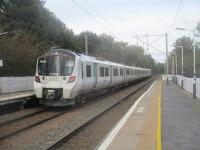
Grange Park: 717016, with a Great Northern service from Moorgate to Watton-at-Stone in Hertfordshire, departing from Grange Park station on 30th October 2019. Just north of here the original line to the 1871 terminus at Enfield, of which nothing now remains, went straight ahead while this train will leave the 1871 tracks and veer slightly right onto the tracks opened in 1910 with the first stage of the incorporation of the line into the Hertford North Loop from Enfield to Cuffley.
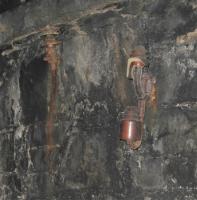
Eshiels Tunnel: Two generations of communications equipment (by the look of it) inside Eshiels tunnel to the east of Peebles. Photographed 30 October 2019.
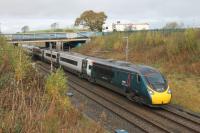
Galgate: 390132 passes under the Jcn 33 slip road, and Hampson Lane bridge near Galgate, with a Glasgow to Euston service on 30th October 2020. These cutting sides were completely cleared during 2016 (Image [[54821]]) but the vegetation is now established again.
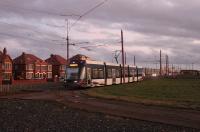
Little Bispham [Tram]: The setting sun illuminates 017 as it pulls away from the Little Bispham stop heading for Fleetwood on 30th October 2020. The line in the foreground is the turning circle, still used by Heritage and illuminations tours and other busy times when extra trams operate the core section between here and the Pleasure Beach.
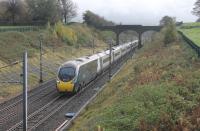
Galgate: After a wet morning there is a little watery sunshine as 390103 powers north through the cutting at Hampson on 30th October 2020.
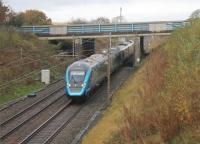
Galgate: Most southbound TPEs from Glasgow and Edinburgh run through to Manchester or Liverpool but this Class 397, seen in the cutting at Hampson Lane near Galgate on 30th October 2020, was terminating at Preston.
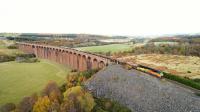
Culloden Viaduct: The diverted Aberdeen Waterloo to Irvine Caledonian Paper Mill slurry tanks pictured heading south off Culloden Viaduct, hauled by 70810 yet again, on 30th October 2020. With the Dundee - Aberdeen line reopening on Tuesday 3rd November, this was the last time this train was diverted.
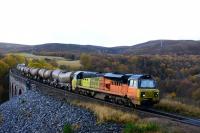
Slochd Viaduct: The southbound slurry tanks from Aberdeen Waterloo to Irvine Caledonian Paper Mill, crossing Slochd Viaduct headed by 70810 on 30th October 2020. This was the last time this train was diverted as the Aberdeen-Dundee line re-opened on the 3rd of November.
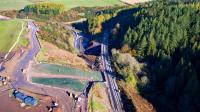
Carron Water Bridge [West Carmont]: The site of the derailment has been restored with new track,and drainage and repairs to the bridge.
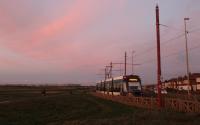
Little Bispham [Tram]: A sunset sky over the Fylde Coast in October 2020, as a Flexity tram leaves Little Bispham heading for Fleetwood.
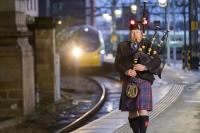
Glasgow Central: A piper welcomes the 'Climate Train' at Glasgow Central on the 30th of October. The service started from Amsterdam and travelled via Rotterdam, Brussels to London St Pancras with the last stage running from London Euston. #COP26

ROF Rotherwas: This 'gate guardian' is an Andrew Barclay 0-4-0DM, built during 1941 to a War Office requirement, shown as ARMY 220. It is parked outside the Rotherwas Industrial Estate, five miles to the south of Hereford, marking the site's earlier role as ROF Rotherwas. An overhaul date on the brake cylinder indicates the loco may have been in service into the late seventies but that will have been at another site as ROF Rotherwas closed in 1967.

ROF Rotherwas: The Rotherwas gate guardian, an Andrew Barclay 0-4-0DM, is parked on a piece of track with a 5-plank wagon for company at the entrance to the Rotherwas Industrial Estate. This is built on the site of the old ROF complex, which had twenty seven miles of internal railway tracks.
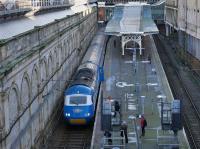
Edinburgh Waverley: Waverley's platform 9 sees LSL's 'Royal Highland Pullman,' from St Pancras to Inverness, call on 30 October 2021.
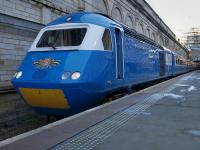
Edinburgh Waverley: LSL's 'Royal Highland Pullman' from St Pancras to Inverness calls at Waverley platform 9 on 30 October 2021.
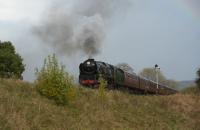
Winchcombe: The G&WR 2022 gala timetable did not run according to plan, as it seems that the loop points at Gotherington failed, and a few trains were cancelled. However, BR Merchant Navy 4-6-2 35006 'P&O Line' did run, and with a signal near Winchcombe now cleared to proceed, it set off in a grand style.
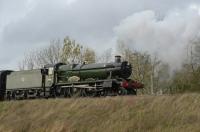
Winchcombe: GWR Modified Hall 7903 'Foremarke Hall' departing from Winchcombe during the G&WR autumn 2022 gala weekend.
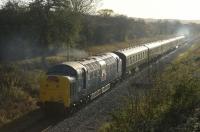
Winchcombe: Class 55 Deltic 55019 'Royal Highland Fusilier' guesting at the G&WR autumn 2022 gala, courtesy of the Deltic Preservation Society. It headed several trains during the day but here is in the role of 'Tail end Charlie'.
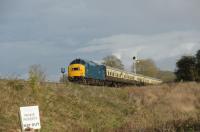
Winchcombe: Resident EE Type 3 37215 at Winchcombe during the G&WR Mixed Traffic Gala on 30th October 2022. This loco has been in preservation for nearly thirty years.
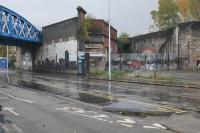
Gorbals Junction: Looking north to Gorbals Junction on 30 October 2022. On the left is the City of Glasgow Union, served by Main Street station from 1872 to 1900. On the right is the closed line to St Enoch with the stairway leading to Gorbals station from 1877 to 1928.
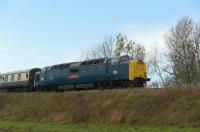
Winchcombe: Class 55 Deltic 55019 'Royal Highland Fusilier' was the No.1 guest engine at the Gloucestershire and Warwickshire Mixed Traffic Gala at the end of October 2022. It visited courtesy of the Deltic Preservation Society is seen climbing out of Winchcombe.
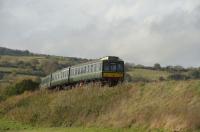
Winchcombe: As well as steam and diesel loco-hauled trains at the G&WR autumn gala, this smart looking 3-car Suburban DMU was running a shuttle service between Toddington and Winchcombe.
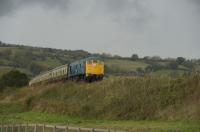
Winchcombe: BR Sulzer Type 2, Class 24, 24081 departing Winchcombe during the G&WR Mixed Traffic Gala in October 2022. This loco has been in preservation for over forty years now. See image [[49572]] from 1982.
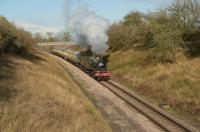
Toddington: 'Manor' 7820 leading, with 'Modified Hall' 7903 next to the coaches, seen southbound at the Stanton road overbridge during the Mixed Traffic Gala on the G&WR on 30 October 2022.
Events
Events from the chronology which occured on this day. This generally lists events before 1995, the creation of the website.
| Year | Companies | Description |
|---|---|---|
| 1857 | Deeside Extension Railway | First sod cut. |
| 1864 | Portpatrick Railway | Power given to own and operate steamboats. |
| 1864 | Portpatrick Railway | Working agreement with Caledonian Railway. |
| 1955 | Dunblane, Doune and Callander Railway | Doune to Dunblane singled. Between Dunblane and Springbank Mill Siding the westbound line was lifted, and the line slewed at Stockbridge to the west with the eastbound line lifted between there and Doune. |
News
These are old news items which which occured on this day. This generally lists events after 1995, the creation of the website.
| Year | Companies | Description |
|---|---|---|
| 2002 | Signalling problems at Glasgow Central | Signalling problems at Glasgow Central are delaying ScotRail, Virgin and GNER services from the station. The problem is due to be cleared by lunchtime. |
| 2006 | Accident suspected in train death [BBC News] | A man dies when he is hit by a train after apparently falling onto a railway line in West Sussex. |
| 2006 | MSPs demand airport link pitches [BBC News] | A commitment to provide football pitches is needed by those behind the Glasgow Airport rail link, MSPs say. |
| 2007 | HULL DOCK RAIL IMPROVEMENTS - WORK BEGINS [Network Rail Article] | |
| 2011 | ^Thomas the tank^ railway Talyllyn^s engineers^ award [BBC News] | The railway which inspired the author of the Thomas the Tank Engine books has been honoured. Talyllyn, which was built in 1866 to carry slate and passengers in mid Wales, became the world^s first volunteer-run heritage railway in 1951. The cartoon engine^s creator, the Reverend W Awdry, joined the volunteers in 1952. |
| 2012 | Department for Transport knew it risked legal challenge over West Coast franchise [Telegraph] | The Department for Transport knew seven months ago that it did not have the correct methods to evaluate multi-billion pound bids for the West Coast rail franchise and that it risked a legal challenge from one of the train operators competing for the contract. [From Mark Bartlett] |
| 2012 | ‘Landmark day’ with first element of £4m heritage investment [Carrick Times] | The cornerstone has been set in place in a major scheme designed to create a heritage engineering museum and visitor attraction at the Railway Preservation Society of Ireland’s Whitehead base. |
| 2012 | Gloucestershire Warwickshire Railway reopens after £1m repairs [BBC News] | A heritage railway line badly damaged by two landslips has reopened following repairs costing £1m. As a result of collapsed embankments at Gotherington and Winchcombe, the 12 mile-long (19 km) Gloucestershire Warwickshire Railway has faced disruptions for three years. The repairs were funded by an emergency appeal launched two years ago. |
| 2014 | Manchester Airport: Chaos on the cards with train station set to shut for three weeks [MEN] | Manchester Airport’s train station will be closed for three weeks as work is carried out to complete a fourth platform. Transport chiefs have warned travellers will face four weeks of disruption and will have to find alternative ways of getting to and from the airport as rail replacement buses are put on to cope with the disruption in early 2015. |
| 2017 | Women on track for brighter future with the railways [Scotsman] | A new group is to be launched to increase significantly the number of women working on Scotlands booming railways. Despite around half of train passengers being female, women account for only one in five of those in the rail industry north of the Border. |
| 2017 | Clun Castle steams again after ten year restoration [BBC News] | A record-breaking steam locomotive has been restored by engineers in Birmingham. Clun Castle was last seen on the mainline in 1988. The locomotive set a record for running the fastest service between Bristol and Plymouth and was also the last steam engine to leave London Paddington station. |
| 2017 | Arriva Trains Wales drops out of Welsh rail franchise bid [BBC News] | The firm that runs most of Wales^ rail network has pulled out of the contest to continue running it from 2018. Arriva has said Arriva Trains Wales was ^no longer participating in the Wales and Borders competition^, adding it had ^not been an easy decision^. Transport for Wales said it was ^not uncommon^ for bidders for major projects to withdraw. The Tories said Arriva^s withdrawal ^raises questions^ about government engagement with the process. An Arriva-owned company has run the franchise since 2003. There are three remaining bidders - Abellio, KeolisAmey and MTR. Responsibility for the process of finding a company to run the services is set to be devolved from 2018. |
| 2018 | Broken track disrupts Perth to Inverness train services [BBC News] | Buses are being used to ease the disruption to train services between Perth and Inverness. |
| 2018 | CCTV blackout lets Aberdeen man cross rail station tracks twice unnoticed by staff [Press and Journal] | Transport police have been unable to investigate the incident in which a toilet-seeking Aberdonian trespassed on railway lines in Fife because ScotRail’s CCTV system was rebooting at the time it happened. |
| 2018 | RMT union ^appalled^ by human waste train plan [BBC News] | ScotRail admits that only one of a new fleet of high-speed trains currently has a tank to collect human waste. |
| 2019 | Residents urged to have their say on ScotRail services [Press and Journal] | Mearns residents are being urged to voice their opinions on ScotRail services ahead of a crunch meeting with transport chiefs. |
| 2019 | Moving slope stopped in its tracks to protect Settle-Carlisle railway line [Network Rail] | A steep railway cutting that was edging slowly towards the Settle-Carlisle railway line has been strengthened thanks to a £1.2m investment. |
| 2019 | Two years of transformation at Queen Street [Network Rail] | October marks two years since Network Rail began the main £120m redevelopment of Glasgow Queen Street station. |
| 2019 | CalMac warns of extra £9m winter repairs on its ageing ferry fleet [The Herald] | CalMac has been forced to take ferries out of service this winter as it tries to keep its ageing, rusting fleet afloat. |

